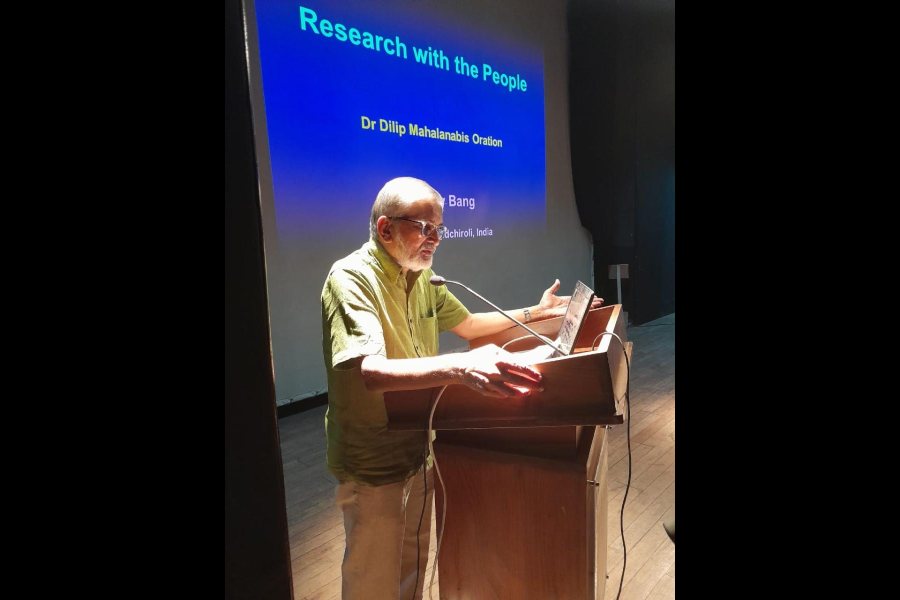Researchers, particularly those working in the field of public health, should work with the people instead of research on the people, Abhay Bang, a social activist and researcher in community health and neonatal care at Gadchiroli, Maharashtra, said at a programme in the city on Friday.
Bang was in the city to deliver the second Dilip Mahalanabis Oration Lecture in memory of the person who pioneered the wide-scale use of the oral rehydration solution (ORS) at a refugee camp in Bongaon in 1971. Liver Foundation, West Bengal, organised the lecture.
“I have titled my talk ‘Research with the people’. Instead of researching on people, a researcher should research with the people,” said Bang, who delivered his hour-long address at the Ashutosh Centenary Hall at the Indian Museum.
The community health researcher began his address by paying respect to Dilip Mahalanabis, who he said, “empowered the people” and translated basic science with a simplified form to save the lives of millions of people.
“Dilip Mahalanabish and Richard Cash came up with their simplified low-cost, effective solution which can be given in the hands of people and empower them. Most medical discoveries, and technologies, dis-empower people. But Mahalanobish with this revolutionary technology saved the lives of millions of people,” said Bang.
Author Anita Agnihotri chaired the session.
Cash, the distinguished global health scientist at the Harvard Chan School of Public Health who published the results of the clinical trials on ORS in Lancet in 1968, delivered the first Dilip Mahalanabis Oration Lecture last year.
Mahalanabis, who died in October 2022, was credited with spearheading the wide-scale use of ORS at a refugee camp in Bongaon during the 1971 Bangladesh Liberation War.
Bang said this spirit of translating basic science in a simplified form to save the lives of millions of people which Mahalanobish has pioneered, has been at the heart of what they do at Gadchiroli in Maharashtra.
Friday’s programme started with the observation of a minute-long silence in memory of the 31-year-old postgraduate trainee doctor of the RG Kar Medical College and Hospital who was brutally raped and murdered on August 9.
Abhijit Chowdhury, the secretary of Liver Foundation, which has built a hospital in Sonarpur on the southern fringes of the city, where people are treated at a subsidised rate, said: “At a time when the city is going through the tumultuous time to protest the rape and murder of a young doctor, Abhay Bang who has worked in the areas of community health at Gadchiroli, came to deliver the second Dilip Mahalanabis Oration Lecture”.
Bang and his wife Rani have co-founded SEARCH (Society for Education, Action and Research in Community Health) at Gadchiroli.
The researcher said their vision is to empower individuals and communities to take charge of their health, thereby, helping them achieve freedom from disease.
He said while working with the tribals in the area he realised that a community
health expert must learn from the people what health issues they think, should be addressed. “To work for the people of Gadchiroli, you ought to think like them. So, Rani and I started spending time with the tribals there. We wanted to know what health problems they have. After a lot of deliberations, they told us that malaria, white discharge, alcohol, child death and back aches are the five areas where they want us to conduct research.”
“This has been our research agenda over the past 35 years. Don’t look forward to publications in journals alone. Listen to the people and address their issues,” he said.










